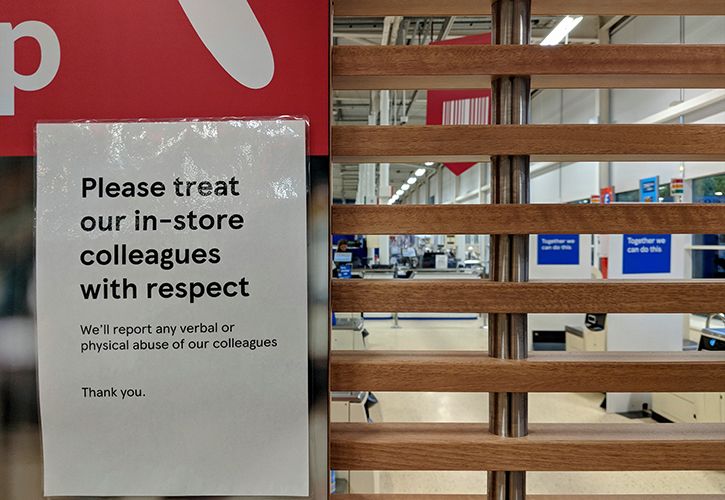UK DIY News
Nearly Half Of Retail Workers Contemplated Quitting This Summer

Younger and LGBTQ+ staff drove surge in retail workers at risk of quitting or working while unwell this summer - the Retail Trust and AlixPartners’ Retail People Index
- More than two in five UK retail workers were at risk of quitting their jobs and working while unwell over the summer; younger and LGBTQ+ employees most affected
- Older female retail workers experienced biggest declines in overall wellbeing this summer
- 71% of all retail employees surveyed by the Retail Trust said mental health issues cause them to underperform at work
More than two in five UK retail employees (43%) were at risk of quitting their jobs between July and September this year, an 11% increase from the previous three months of 2024, according to the Retail Trust and AlixPartners’ latest Retail People Index.
The index, which surveyed 1,100 UK retail employees in July, August and September, found the percentage of people working whilst physically or mentally unwell, also increased to 41% over this time. This is a 14% year-on-year increase, and a 7% rise from the previous quarter of 2024.
Younger retail workers, aged 19 to 24, and LGBTQ+ employees had the biggest ‘flight risk’, or propensity to quit, of 47%, due to feeling more anxious and depressed about work and also least likely to feel they were recognised for doing something well.
Retail employees aged 19 to 34 showed the highest levels of presenteeism, where employees work when physically or mentally unwell, with half working while unwell.
And female workers experienced some of the biggest mental health declines over the period, with an overall wellbeing score drop from 72% in July to 52% in September for women aged 55 to 64. Those aged 25 to 34 also experienced lower wellbeing in July and September.
Staff were asked, by the Retail Trust’s and employee engagement platform WorkL’s online happiness assessment, about their mental and physical health and how valued and fulfilled they feel, to create an overall wellbeing score for the Retail People Index.
Questions around pay, recognition, relationships with managers, work-related anxiety and workplace safety were among those used to separately help calculate the likelihood of them leaving their jobs or working while unwell between July and September 2024.
Chris Brook-Carter, chief executive of the Retail Trust, said: “There are often unrealistic expectations that the summer will be a less stressful time for people working in retail, but the reality is it often brings added pressures for working parents and those having to put in extra shifts to cover colleagues’ holidays.
“That's why it's important employers don’t underestimate the support their staff members need during the summer months, especially as they'll need a happy and healthy workforce to rely on as they gear up for the busy shopping period at the end of the year.
“Investing in staff wellbeing and retention during this crucial period will allow retailers to be more productive and successful for the rest of the year, thanks to the fundamental link between the hope, health and happiness of a business’s workforce and its economic resilience.
“Thank you to AlixPartners and to our data partner WorkL for their support in creating this valuable index. Our hope is that businesses from across the retail sector and beyond can now build this insight into their wellbeing strategies as they look to the tailored support their people will need in 2025.”
Laura Bond, director at AlixPartners said: “Retail employees clearly feel increasingly unsettled. These year-on-year insights underscore the uncertainty felt across the industry – and the autumn Budget likely will have heightened tensions further as people brace for potential job cuts and role shifts in 2025.
“As retail leaders respond to the Budget, they have an opportunity and responsibility to step up and engage meaningfully with their teams. Supporting people through this period isn't just the right thing to do – it’s a key driver of business performance.
“High-performing retailers consistently demonstrate effective employee engagement and a commitment to advancing diversity and inclusion. These are critical strategies for navigating challenges, while fostering resilience and growth within the organisation.”
One in six miss work due to poor mental health and 39% are looking to quit due to abuse
Separate research, carried out for the Retail Trust’s health of retail report, found one in six (17%) retail workers have missed at least a day of work due to poor mental health this year, with call-centre staff and younger workers twice as likely to have called in sick. Nearly three quarters (71%) of all retail employees surveyed by the Retail Trust said mental health issues are also causing them to underperform at work.
Research for the Retail Trust’s respect retail campaign in October also showed 39% are now considering leaving their jobs or the industry due to the rise in violent and abusive incidents facing retail staff.
A study by CIPD has found UK employers are now absent for an average of 7.8 days, compared to 5.8 days before the pandemic, while the average cost to replace a departing employee earning £25,000 a year or more is £30,614, according to Oxford Economics.
The Retail Trust runs a wellbeing helpline and provides counselling and financial aid for retail workers and works with more than 200 retail employers to improve the mental health of their staff. A generative AI powered happiness dashboard was launched by the Retail Trust earlier this year to help retailers better track staff wellbeing trends and improve the effectiveness of support.
Source : The Retail Trust
Image : Eddie Jordan / shutterstock / 1743926996
Insight DIY is the only source of market information that I need and they always have the latest news before anyone else.











































